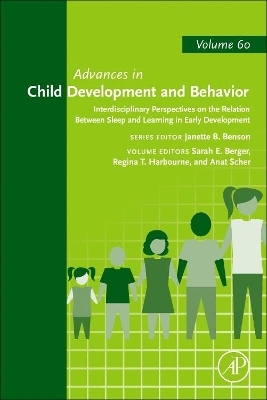
Interdisciplinary Perspectives on the Relation between Sleep and Learning in Early Development
Academic Press Inc (Verlag)
978-0-323-85113-8 (ISBN)
Dr. Sarah Berger is a Professor of Psychology at the College of Staten Island and the Graduate Center of the City University of New York. She received her PhD from New York University. Dr. Berger was an American Association of University Women Postdoctoral Research Fellow and a Fulbright Research Scholar. Dr. Berger studies the interaction between cognitive and motor development in infancy, particularly response inhibition and its implications for the allocation of attention in very young children. Recent work, in collaboration with Dr. Regina Harbourne, has shown that attention is best understood by taking into account sensorimotor activity as a context for expertise or a source of attentional demands. This work suggests a set of principles for understanding delayed development which could contribute to identifying features of early intervention. A line of NSF/BSF-funded work, in collaboration with Dr. Anat Scher, has been the first to study the impact of sleep on motor problem solving in infancy. This project has shown that individual differences in the quality of night sleep impact next day’s learning; that napping and night sleep work cummulatively to consolidate new information; and that the timing of a nap relative to learning impacts memory consolidation. In addition, new funding from the NSF, in collaboration with Dr. Harbourne, supports the study of preterm infants, sleep, and problem solving Dr. Harbourne is an associate professor and teaches pediatrics, research and neuroscience in the Rangos School of Health Sciences at Duquesne University in Pittsburgh, PA. Her 40+ years of pediatric experience includes early intervention, school-based, and clinic-based work, as well as teaching continuing education courses related to developmental intervention. Her research and numerous publications focus on early intervention for children with neuromotor dysfunction, and the interaction between motor, visual, and cognitive systems to improve learning and overall development. She currently leads a large multi-site effectiveness trial for early intervention, the START-Play study, funded by the U.S. Department of Education. In addition she is funded by NIH for a sponsored intervention trial for infants with cerebral palsy and NSF in collaboration with Sarah Berger, PhD, for the study of preterm infants, sleep and problem solving. Her expertise in early learning, motor development, and intervention for neuromotor disorders, has resulted in over 30 peer-reviewed publications on these topics. She has presented internationally to therapists and researchers, and is known for her translation of research to clinically relevant practice for physical and occupational therapists. Dr. Anat Scher is a Professor of Developmental Psychology at the Department of Counseling and Human Development, University of Haifa, Israel. She received her PhD from University of Calgary (Educational Psychology) and conducted Postdoctoral Research at Oxford University. Dr. Scher’s main research interest is sleep and development. Her studies address the interrelations between sleep and other domains, including, temperament, emotional, motor and cognitive development, parent-child interactions, parenting practices and ideologies. One line of research focuses on developmental transitions, such as the onset of crawling, walking, puberty, and the involvement of sleep in these phenomena; complementary questions focus on the role of child and contextual aspects in regulating transitions between awake and asleep states. Sleep in special populations, including prematurity, neuropsychological impairments and children with ASD are also among the topics of on-going research.
Introduction
1. Introduction to Volume Sarah Berger and Anat Scher
2. The relation between sleep and neurocognitive development in infancy and early childhood: A neuroscience perspective Consuelo Basile, Federica Gigliotti, Serena Cesario, Oliviero Bruni
Sleep, Learning, Memory and Executive Functioning in Infancy and Early Childhood
3. The effect of napping and night-time sleep on memory in infants Carolin Konrad and Sabine Seehagen
4. Newly walking infants’ night sleep impacts next day learning and problem solving Melissa Horger, Aaron DeMasi, Angelina Marie Allia, Anat Scher and Sarah Berger
5. The Contribution of Good Sleep to Working Memory in Preschool: A matter of sleep quality or duration? Maayan Peled and Anat Scher
6. Sleep and self-regulation in early childhood Reagan S. Breitenstein, Caroline P. Hoyniak, Maureen E. McQuillan and John E. Bates
7. The role of naps in memory and executive functioning in early childhood Rebecca Spencer
8. Sleep development in preschool predicts executive functioning in early elementary school Annie Bernier, Catherine Cimon-Paquet and Émilie Tétreault
9. Individual Differences in the Effects of Child Sleep Problems on Early Executive Functioning Timothy D. Nelson, Anna Johnson, Erin L. Ramsdell and Rebecca L. Brock
Sleep and Learning in Special Populations
10. Neonatal Sleep Development and Early Learning in Infants with Prenatal Opioid Exposure Marie J. Hayes, Beth Logan, Nicole A. Heller, Hira Shrestha, Katrina M. Daigle, Mark Brown, Jonathan Paul and Deborah G. Morrison
11. Sleep’s role in memory consolidation: What can we learn from atypical development? Jamie Edgin and Angela F. Lukowski
12. Sleep-related learning in Williams Syndrome and Down's Syndrome Dagmara Dimitriou and Elizabeth J. Halstead
13. Sleep, Cognition and Executive Functioning in Young Children with Cerebral Palsy Andrea Freeman Duncan and Nathalie Maitre
Conclusion
14. Conclusions and Implications for Early Intervention Regina T. Harbourne
| Erscheinungsdatum | 09.03.2021 |
|---|---|
| Reihe/Serie | Advances in Child Development and Behavior |
| Verlagsort | Oxford |
| Sprache | englisch |
| Maße | 152 x 229 mm |
| Gewicht | 720 g |
| Themenwelt | Geisteswissenschaften ► Psychologie ► Entwicklungspsychologie |
| ISBN-10 | 0-323-85113-4 / 0323851134 |
| ISBN-13 | 978-0-323-85113-8 / 9780323851138 |
| Zustand | Neuware |
| Haben Sie eine Frage zum Produkt? |
aus dem Bereich


